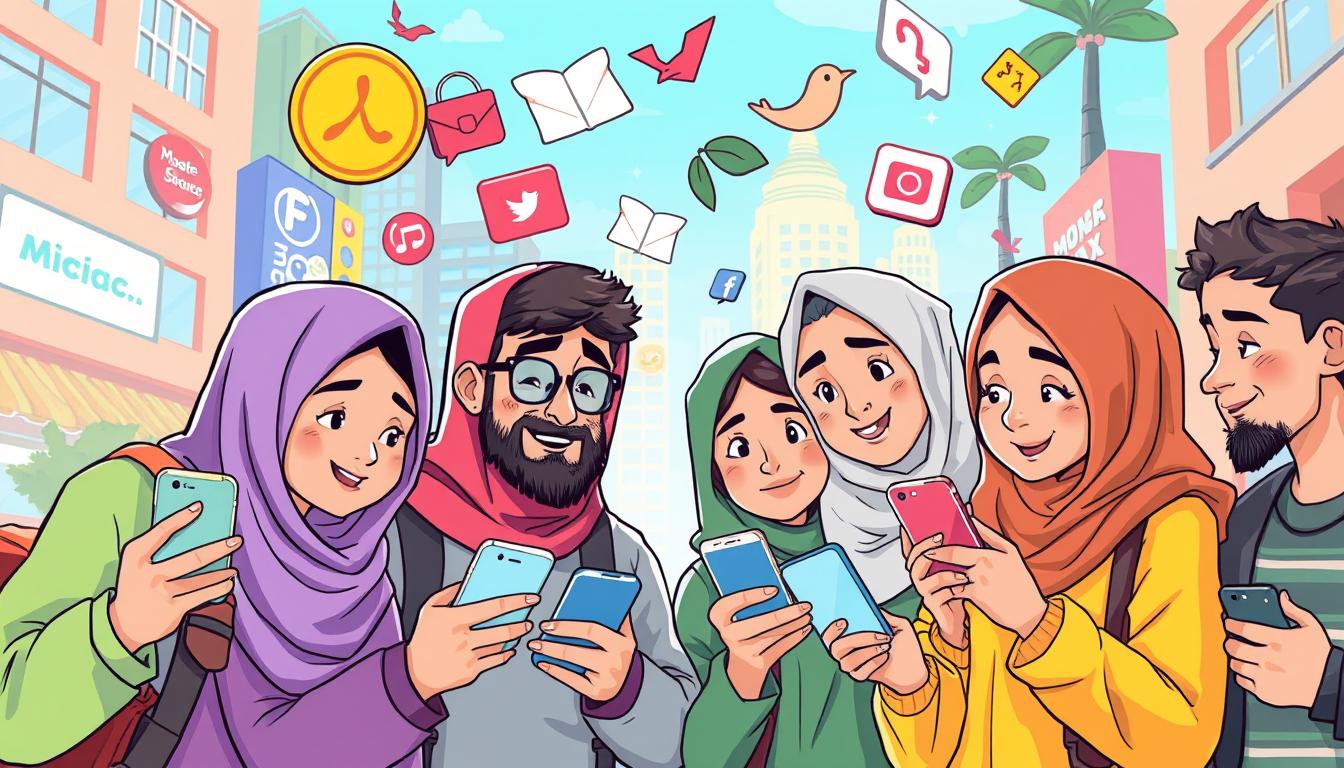Guidance for Muslim Youth Navigating Social Media
In today’s digital world, Muslim youth face a big challenge. They want to stay true to their faith but also enjoy social media. Platforms like Instagram, Snapchat, TikTok, and WhatsApp are great for connecting and sharing thoughts. Yet, they can also make it hard to keep Islamic values.
The Prophet Muhammad ﷺ taught us about the power of our words. He said a single statement can reach thousands or even millions online. This power is both a blessing and a big responsibility. By using social media wisely, Muslim youth can lead others to good, inspire faith, and share knowledge.
Islamic teachings offer a solid base for being good online citizens. When we use social media to please Allah and help others, it can be a form of worship. This guidance helps Muslim youth find a balance between their faith and digital life. It encourages them to build positive online communities while staying true to Islamic values.
Key Takeaways
- Social media can be a tool for earning rewards when used with the right intention
- Islamic values should guide online behavior and interactions
- Spreading beneficial knowledge and inspiring faith are positive uses of social media
- Mindful posting and sharing can transform social media use into an act of worship
- Balance between online engagement and real-life responsibilities is crucial
- Authenticity and truthfulness in online content are essential for Muslim youth
Understanding the Impact of Social Media on Muslim Youth
Social media is a big part of our lives today, especially for the young. For Muslim youth in Australia, it brings both challenges and chances to keep their faith and identity strong.
The prevalence of social media in modern life
Worldwide, 70% of internet users are on social media. This number goes up to 90% for the young. In Australia, where 3% of people are Muslim, social media is key for connecting with the community.
Challenges and opportunities for Muslim youth online
Young Muslims face special challenges online. A study in Australia showed they worry about discrimination and seeing unrealistic standards on social media. But, these platforms also offer chances for positive engagement and keeping their Islamic identity.
Balancing Islamic values with digital engagement
Muslim youth are finding ways to keep their faith and be online. Many try to use social media less and use technology in a halal way. Parents are key in helping them through this digital world.
“Social media is an important extension of social and cultural connections for young Muslims, especially during times of physical isolation.”
Building a positive online Muslim community takes effort and awareness. By understanding social media’s impact, Muslim youth can use the digital world while staying true to their values.
Islamic Principles for Online Behavior
Islamic etiquette online is key for Muslims in the digital world. With social media in our lives, it’s vital for Muslim youth to keep their online presence modest.
Maintaining Modesty and Dignity
Islam values privacy and modesty. A 2019 survey by IDExperts showed over 60% of adults are concerned about Facebook’s privacy. For Muslims, keeping Islamic values online is crucial.
- Seeking permission before entering someone’s space
- Avoiding gossip and spying
- Protecting intimate body parts
- Lowering one’s gaze in certain situations
Honesty and Integrity in Online Interactions
Muslims should always be truthful online. This means checking facts before sharing and not hiding behind anonymity. Taking time to think before posting can help avoid regrets.
Avoiding Backbiting and Gossip
Social platforms can spread negativity. Muslims should avoid backbiting and rumors online. Instead, focus on creating positive spaces and sharing uplifting content that follows Islamic values.
“The best among you are those who have the best manners and character.” – Prophet Muhammad (PBUH)
By following these guidelines, Muslim youth can use social media wisely. They can keep their faith and identity strong in the digital world.
Guidance for Muslim Youth Navigating Social Media
Muslim youth face unique challenges in the digital age. Social media offers chances for connection and self-expression. Yet, it also poses risks to faith and identity. This guide offers practical advice for keeping Islamic values online while engaging meaningfully.
Social media is very popular among Muslims, with 98% using it. Instagram leads at 83.3%, followed by YouTube and Snapchat. This shows the need for guidance specific to Muslim youth.
Remember the Prophet Muhammad’s (PBUH) advice on the influence of company. Your online friends can affect your faith and character. Choose to follow accounts that promote goodness and strengthen your Islamic values.
“A good friend and a bad friend are like a perfume-seller and a blacksmith: The perfume-seller might give you some perfume as a gift, or you might buy some from him, or at least you might smell its fragrance. As for the blacksmith, he might singe your clothes, and at the very least you will breathe in the fumes of the furnace.” – Sahih al-Bukhari 5534
Use social media to spread positivity and inspire others. Share real Islamic content, but check facts first. Avoid clickbait, even for da’wah. Your goals and methods should follow Islamic principles.
Be careful of cyberbullying and hate speech. The Quran teaches us to respect and be kind to everyone. Apply this to your online interactions, creating a positive digital space for all.
Protecting Faith and Identity in the Digital Age
The digital world presents new challenges for Muslim youth. With 58% of young people looking to social media for religious education, it’s key to develop strong digital citizenship for Muslims.
Strengthening Islamic Knowledge
Many Muslim youths lack solid theological views. To fight misinformation, it’s vital to seek knowledge from trusted sources. Online platforms like Islam Online provide credible, multilingual content to strengthen your Islamic foundation.
Cultivating a Positive Muslim Identity
Social media lets Muslims create digital communities and share their faith. Influential figures like Amr Khaled and Moustafa Hosni connect with youth online. By following their example, you can show the beauty of Islam and promote understanding.
Dealing with Peer Pressure
The internet has changed how Islamic teachings are viewed. Young Muslims face pressure to follow online trends. Remember, your actions online are not anonymous to Allah. Stay true to your values and seek guidance from “hybrid imams” like Yasir Qadhi or Mufti Menk, who blend religious knowledge with digital expertise.
“Verify information before sharing it with others.” – Islamic teaching
By strengthening your faith, cultivating a positive online presence, and resisting peer pressure, you can navigate the digital world while staying true to your Islamic identity.
Fostering Positive Online Communities
The digital age has opened up new ways for Muslims to connect and share their faith. Millions of Muslims use social media, making these platforms key for building an online Muslim community. Facebook is the most popular in the Arab World, with over 81 million users. Twitter is close behind, with nearly 6 million users.
Being kind online is crucial for a positive digital space. Using respectful greetings like “As-salamu alaykum” and saying “Jazakallahu Khairan” for thanks helps a lot. By being kind and avoiding gossip, Muslims can make a welcoming space for everyone.
Social media is a great chance to grow the global Muslim community:
- Find inspiring Muslim content creators
- Have deep conversations
- Make virtual friends
- Share Islamic knowledge and values
Well-known Islamic figures are using social media to reach more people. For example, Mohammad Al-Arifi, a famous Islamic preacher, has nine million followers on Twitter. This shows how social platforms can spread Islamic teachings and build community.
“Social media allows for connectedness and greater access to religious resources.”
By using these digital tools wisely, Muslims can show the true spirit of Islam online. This not only strengthens individual faith but also helps create a more connected and supportive Ummah in the digital world.
Managing Screen Time and Digital Wellness
In today’s world, finding a balance between screen time and real-life activities is key. The COVID-19 pandemic made us all spend more time online. This change shows how important it is to use technology wisely.
Setting Healthy Boundaries
Using technology in a halal way means setting limits on social media. The American Academy of Pediatrics has guidelines for screen time based on age. Parents can use apps like Google Family Link to keep an eye on their kids’ screen time.
Balancing Online and Offline Activities
Muslim youth should aim for a balance between digital and offline activities. Encourage them to try outdoor activities, crafts, and games. Apps like Nike Training Club can help with exercise, and Duolingo is great for learning.
Prioritizing Real-World Relationships
Online connections are good, but real-life relationships are more important. Family activities help youth disconnect from screens and build stronger bonds. It’s crucial to make sure social media doesn’t get in the way of prayer times or family duties.
“Technology is a useful servant but a dangerous master.” – Christian Lous Lange
By finding a balanced way to use technology, Muslim youth can thrive in the digital world. It’s all about using tech to grow and connect, not to replace real-life experiences.
Navigating Content Creation and Sharing
In today’s digital world, Muslim youth have special challenges online. It’s important to keep Islamic values in mind when using social media. A modest online presence helps young Muslims stay faithful and make a good impact.
Here are some tips for sharing content:
- Make sure your posts follow Islamic principles
- Share things that are good and educational
- Don’t post anything that’s not right or misleading
- Think about how your posts will be seen in the future
Your online actions create a lasting legacy. During Ramadan, Muslims spend a lot of time online. They like short videos on TikTok and Instagram. This is a chance to share content that shows Islamic values.
“Celebrate what makes you, YOU.”
This idea tells young Muslims to be proud of who they are online. By sharing positive stories and understanding different cultures, creators can tackle issues like Islamophobia and generational gaps.
Charity is a big part of Ramadan. Use your platform to talk about Zakat and helping others. Encourage people to give back and help their communities.
Addressing Cyberbullying and Online Harassment
In today’s digital world, Muslim youth face special challenges with cyberbullying and online harassment. With 95% of teenagers seeing cyberbullying on social media, it’s key to tackle this issue. Islamic etiquette online is crucial in fighting these harmful acts and making the internet safer.
Recognizing signs of cyberbullying
Cyberbullying can be many things, from mean comments to spreading rumors. Shockingly, 1 in 5 teens face text bullying. It’s important for Muslim youth to know these signs and understand that stopping cyberbullying starts with recognizing it. If you see a friend acting differently online or mean posts, it’s time to act.
Islamic teachings on dealing with conflict and adversity
Islam teaches us to handle conflicts wisely and patiently. The Prophet Muhammad (peace be upon him) showed us to answer negativity with kindness. When faced with online harassment, Muslim youth can find strength in these teachings. By responding with kindness, we can stop the cycle of negativity.
Seeking support and reporting abusive behavior
If you’re being cyberbullied, don’t stay silent. Sadly, 50% of bullying incidents are not reported. Talk to trusted adults, friends, or community leaders for help. Most social media sites have ways to report abuse. Use these tools to flag harmful content and protect yourself and others. By taking action, we can make the internet a better place, following Islamic values and promoting respect.
Source Links
- 8 Islamic Guidelines For Using Social Media – Madinah College
- Islamic guidelines for using social media – Madeenah.com
- Social Media and Online Digital Technology Use Among Muslim Young People and Parents: Qualitative Focus Group Study
- Navigating Identity Through Social Media: Twitter Use of Muslim-American Nonprofits
- Social Media in Islam – Primary Ilm
- Social Media & Its Impact on Muslim Youth – Idara Alfurqan
- Why Gen Z Muslims Are Turning to Social Media Over Google for Searches – Muslim Ad Network
- Abdullah
- The Paradoxes of Modern Islamic Discourses and Socio-Religious Transformation in the Digital Age
- Arabic for Social Media: Connecting with the Ummah Online – Roots Muslim School
- Islam and Social Media
- Navigating Religion Online: Jewish and Muslim Responses to Social Media
- Tips for Navigating the Internet – Healthcare and Medical News for Atlanta Physicians
- Raising children in the age of technology
- Navigating Technology and Screen Time for Muslim Kids – resources.muslimkids.tv
- Create content that elevates young Muslim stories
- Ramadan Marketing Guide for 2024 – FlippingBook Blog
- What Bullying Looks Like in the Digital Age and How to Prevent It
- National Center on Safe Supportive Learning Environments (NCSSLE)







